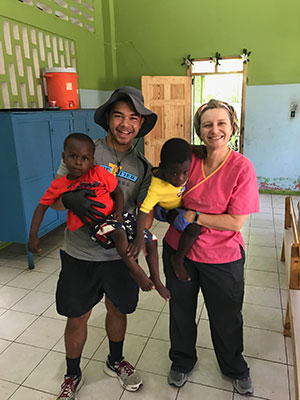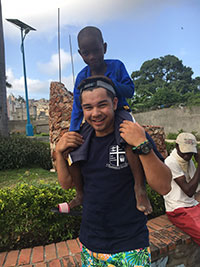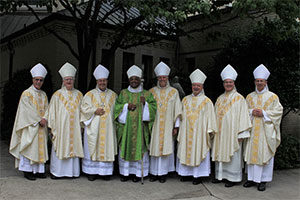‘Each of us can make a difference in the lives of others, so go out and do it!'
 Annmarie and Patrick CamatchoHUNTERSVILLE —For the past two summers, my son Patrick and I have volunteered for a mission trip in Cap-Haïtien, Haiti, to work alongside the Missionaries of the Poor.
Annmarie and Patrick CamatchoHUNTERSVILLE —For the past two summers, my son Patrick and I have volunteered for a mission trip in Cap-Haïtien, Haiti, to work alongside the Missionaries of the Poor.
At this town in the northern part of Haiti, the MOP brothers care for more than 50 children and 80 adults and elderly who are mentally or physically challenged as well as those with HIV and many who have been orphaned or abandoned.
The Missionaries of the Poor in Haiti and all over the world – in Jamaica, the Philippines, Africa, and even here in the Diocese of Charlotte in Monroe – serve the poorest of the poor, people who have been cast off from society.
The brothers are incredible men, who while becoming men of faith, fulfill the mission of priest, mother, father, doctor, pharmacist and catechist to all those who live at their mission. The chance to work with them was an enormous physical challenge but it was also a spiritual retreat for us volunteers.
The poverty in Haiti is overwhelming. The streets are filled with trash, most people live without running water or regular electricity, and children run around without shoes.
But the dignity of each person at the MOP mission is raised as they are fed, bathed and prayed with and for, daily. There is no cost to anyone who lives at these missions and the Lord provides volunteers and His Providence for the food, supplies and other needs of the residents and the brothers. The missions also “employ” workers of their communities, and that helps people living outside the missions as well. These workers are then paid in food, rice and beans.
Each day began at 5:45 a.m. with Mass and Eucharistic Adoration and ended with night prayers at 8:45 p.m. Between that time was midday prayer, the rosary and evening prayers.
Our group of 10 put on a Vacation Bible School each afternoon in the outdoor classroom. The children go to school during the year, but while we were there they were out for summer break.
The children were wide eyed, playful and enjoyed simple pleasures we brought along such as bubbles and beads. As they speak French-Creole and not English, we mostly communicated with the children and elderly with hand gestures, smiles and hugs.
The lessons I learned in Haiti from the brothers and residents are lifelong, and I will take them home with me:
- Keep the Sabbath holy: The MOP priests and brothers work so hard and yet on Sundays they rest, as the Bible instructs. We spent the morning in Mass with the townspeople who came to Mass at the MOP mission. Then it was lunchtime followed by rest. All of the men, women and children there knew the day of rest was Sunday. The children played, the older people read and talked. If the ever-busy brothers can put aside work on Sundays, surely we can, too!
- Priorities, priorities: The top priority of the MOP is to treat all the people there with dignity and give them the essentials in life. We in America are so caught up with many “busy” activities. What are we really busy doing? Is it God’s will and work? The acts of caring for the poor, living the Gospel and teaching them about God – that is what’s necessary.
- Live the Beatitudes: Treat the sick, heal the wounded, feed the hungry, clothe the naked: that is the life of the brothers in Haiti. Is there more that Jesus calls us to do?
- God is in this moment: The people of Haiti live in today. The children do not know what they will wear tomorrow, what might be for dinner tonight, what will be taught at school. They live now, this moment. They do not look to the future. They know that God is here, right now, in the people who take care of them all day, everyday. The closer we live to God, the more we can live in the present moment.
- Work with the saints: Surely the brothers, who have devoted their entire lives to following Jesus and going where they are needed, can be called saints on earth. To work alongside them for a week each summer has been an amazing opportunity to help others and to be Christ for them. The brothers are so committed to their work that they only return home to their own families every 10 years. Christ says He has only our hands and feet to serve. The example the brothers give brings us all closer to God.
- God will provide: The brothers at the MOP missions have confidence that God will provide for all their needs in terms of volunteers, food, medicine and people to assist them. Each visit we have seen this firsthand, where the right people, services and tools were given just at the time they were needed. God’s people will be taken care of, just as Jesus says. There is no need to worry.
- Blessings abound: The smiles of the children as well as the joy of the brothers really conveyed the message that we are always surrounded by the blessings of God. We have so much materially in the United States, but spiritually so many Americans are poor. The Haitian people have so little materially, but have great faith and are eager to hear about God and serve each other as a family at the MOP missions. Despite their physical sufferings, they were always grateful to see the brothers and volunteers. We were greeted each morning with giant smiles and hugs from all of the children.
- Take a leap of faith: Going to Haiti was completely out of my comfort zone, but I had always wanted to go on a mission trip to serve the poor. What could be better than serving alongside your fellow parishioners from St. Mark Church? I knew that God would put together a perfect group to go to Haiti each time. Our groups have been lively and fun – several teachers, a physical therapists, students, nurses, a pilot and others. We can all bring and use our gifts for the greater good!
- Have an attitude of mercy and compassion: Sometimes we need to get off the beaten path and see that while we may struggle, we must put aside ourselves to serve others. We must walk a mile in others’ shoes and try to see life through their eyes. All people deserve mercy and compassion. Jesus gives that to us; we must try our hardest to pass that onto others, so they can see Him, too!
- Sacrifice brings joy: While going to Haiti was a sacrifice of our time, money and physical energy – we all received so much more than we gave. The sacrifice of those weeks will live with us forever as we learned that we are all God’s people, and we all must pray for and serve one another. We must see people as Christ sees them, as sons or daughters of God. The joy we experienced in Haiti will live with us forever and extend well beyond any circumstances we ever encounter. Our joy will always be in the Lord! Each of us can make a difference in the lives of others, so go out and do it!
For more information about the Missionaries of the Poor, read the book written by MOP’s founder, Father Richard Ho Lung, entitled “Candles in the Dark.”
Even if you can’t go on a mission trip to Haiti like we did, you can help support the work of the Missionaries of the Poor. Donations can be mailed to: Missionaries of the Poor, P.O. Box 29893, Atlanta, GA 30359.
 Patrick Camatcho
Patrick Camatcho
— Annmarie Camatcho is a parishioner of St. Mark Church in Huntersville.
 CHARLOTTE — The Catholic bishops of the Atlanta Province gathered for their annual meeting June 25-27, this year held in Charlotte.
CHARLOTTE — The Catholic bishops of the Atlanta Province gathered for their annual meeting June 25-27, this year held in Charlotte.
The Atlanta Province encompasses the Archdiocese of Atlanta and the four dioceses of Charlotte, Raleigh, Charleston and Savannah.
In his homily during Mass June 26 at St. Patrick Cathedral, Archbishop Wilton Gregory of Atlanta focused on the day’s reading from the Gospel of Matthew (Mt 7:6, 12-14) in which Jesus quotes the “Golden Rule”: “Do unto others whatever you would have them do unto you.”
“Jesus doesn’t give us simply wise statements,” Archbishop Gregory said. “He gives us a pathway to life. He’s telling us – bishops, laity, clergy, faithful – don’t just repeat those words, live them.
It’s not simply enough for us to be able to quote the Golden Rule … it’s not something to be spoken. It is something to be lived.”
Pictured above are (from left): Bishop Luis Zarama, Bishop of Raleigh; Bishop J. Kevin Boland, Bishop Emeritus of Savannah; Bishop Robert Guglielmone, Bishop of Charleston; Archbishop Wilton Gregory, Archbishop of Atlanta; Bishop Bernard Shlesinger III, Auxiliary Bishop of Atlanta; Bishop Joel Konzen, S.M., Auxiliary Bishop of Atlanta; Bishop Gregory Hartmayer, OFM Conv., Bishop of Savannah; and Bishop Peter Jugis, Bishop of Charlotte.
— SueAnn Howell, Catholic News Herald. Photos by SueAnn Howell
 CHARLOTTE — On July 1, 1995, after completing several years of formation for the diaconate, three Hispanic men waited excitedly in the halls of St. Gabriel Church to receive the sacred orders that would consecrate them as deacons of the Catholic Church.
CHARLOTTE — On July 1, 1995, after completing several years of formation for the diaconate, three Hispanic men waited excitedly in the halls of St. Gabriel Church to receive the sacred orders that would consecrate them as deacons of the Catholic Church.
Carlos Medina, a native of Nicaragua, and Rafael Torres and Edwin Rodríguez of Puerto Rico were among 11 deacon candidates ordained that day by then Bishop William G. Curlin. It was the first ordination featuring several Latino deacon candidates, and the three men became the nucleus of what today is a growing Latino diaconate presence among the diocese’s parishes.
Early days
In the early 1990s, there were few Hispanics in the Charlotte diocese and finding a Spanish-speaking priest or deacon was rare. The Latino community gathered for Mass at the Catholic Center, on the corner of Shenandoah Avenue and The Plaza, where Our Lady of the Assumption Church was formerly located.
The three new deacons were assigned to the Catholic Center, where Bishop Curlin urged them to “ignite their communities with the fire of Jesus.”
Vincentian Father Vincent Finnerty, who was in charge of Hispanic Ministry in Charlotte at the time, welcomed the new deacons and put them to work in various parishes.
Since then the diocese has grown and changed, and the Latino community now comprises approximately half of the estimated 450,000 Catholics in western North Carolina.
The need for Spanish-speaking clergy remains, but most parishes across the diocese now offer liturgies in Spanish and have clergy who can minister to the growing and diverse Latino community.
The diocese’s Hispanic Ministry, led by Father Fidel Melo, now comprises nine vicariate coordinators. Diocesan events such as the Eucharistic Congress and the Marian Rosary Congress now regularly have Spanish programs that attract thousands. There are three Latino seminarians, and six of the young men studying at St. Joseph College Seminary are Latino.
It all began with these pioneers, who paved the way for a new generation of Latino Catholics who are reaping the harvest that these men planted in fertile ground more than 20 years ago.
Deacon Carlos Medina
Born in Nicaragua, Deacon Medina came to the United States in 1978 to escape a revolution that was bleeding his country.
At the age of 29, he initially settled with his wife and four children in Miami. He wanted to return to Nicaragua, but the war with the Sandinistas made going home impossible.
Looking for better horizons for his family, in 1981 he decided to move to Charlotte.
“The trip made me cry a lot,” he confesses, because the uncertainty of taking his family into an unknown future was hard to bear.
“God took me out of the war and I had to do something,” he thought, and that’s when his commitment and future were transformed.
After moving to Charlotte, he went to pray at St. Patrick Cathedral, thinking: “I do not have anything, and I do not come to ask for anything. I just want to do something for my church.”
He got involved at church, serving as an usher, lector and extraordinary minister of Holy Communion. His faith deepened through involvement with the Cursillo Movement and the diocese’s Lay Ministry program, and he soon felt called to serve God and His Church even more. After talking with his wife, he presented himself to then Bishop John Donoghue to inquire about the diaconate.
He prayed, seeking confirmation from God that it was His will he become a deacon. He went before the Blessed Sacrament and prayed that God’s will be done. “If you want me to be a deacon, I will be, no matter who opposes. But if you do not want it, it doesn’t matter who can help me,” he prayed.
He was ordained in 1995 and was assigned to Sacred Heart Parish in Salisbury, to assist Father Thomas Clements in starting a Hispanic ministry. Then he served for five years at St. Dorothy Church in Lincolnton. In 2002 he was assigned to serve at St. Patrick Cathedral, where he continues to attend daily to Bishop Peter Jugis in his pastoral work.
Deacon Rafael Torres
Puerto Rican native Deacon Torres is a veteran of the Vietnam War who moved to Texas after his job as a refinery supervisor in Puerto Rico ended when the refinery closed in 1982. He did not find work near his brother in Texas at the time, so he and his wife and three children moved to Charlotte where another of his brothers lived. The disruptions in his life caused him to draw closer to his Catholic faith, and he began frequenting the Catholic Center in Charlotte on Friday nights to pray the rosary.
There he met Sister Pilar Dalmau, who was in charge of the center at the time and offered the Cursillo de Cristiandad with instructors from Miami. They trained several faithful, among them Deacon Torres. He was among three who completed the program and continued through to diaconate formation.
Deacon Torres has served at the Catholic Center, in the diocesan Tribunal, and at Our Lady of the Assumption Parish in Charlotte. For the past 20-plus years he has attended Mass at St. Luke Church in Mint Hill, where every Sunday he preaches the homily for the 1 p.m. bilingual Mass.
Thanks to his commitment, attendance at that Mass has increased notably until reaching more than 400 people who fill the church today.
Deacon Edwin Rodríguez
Also ordained with Deacon Medina and Deacon Torres in 1995 was Deacon Rodríguez. Born in 1948 in Rincón, Puerto Rico, he was married and had three children. Before his death in 2012, he served at St. Mark Parish in Huntersville.
— Cesar Hurtado, Hispanic reporter














